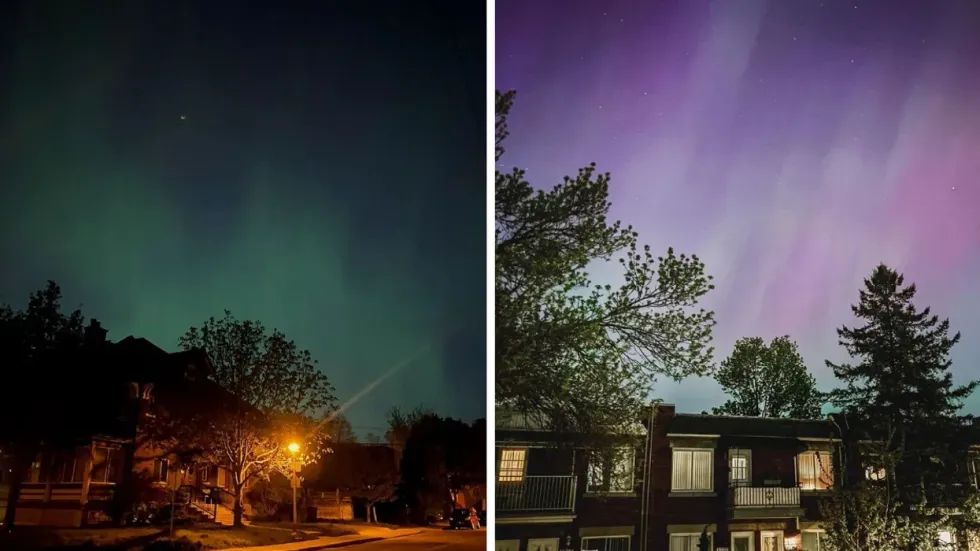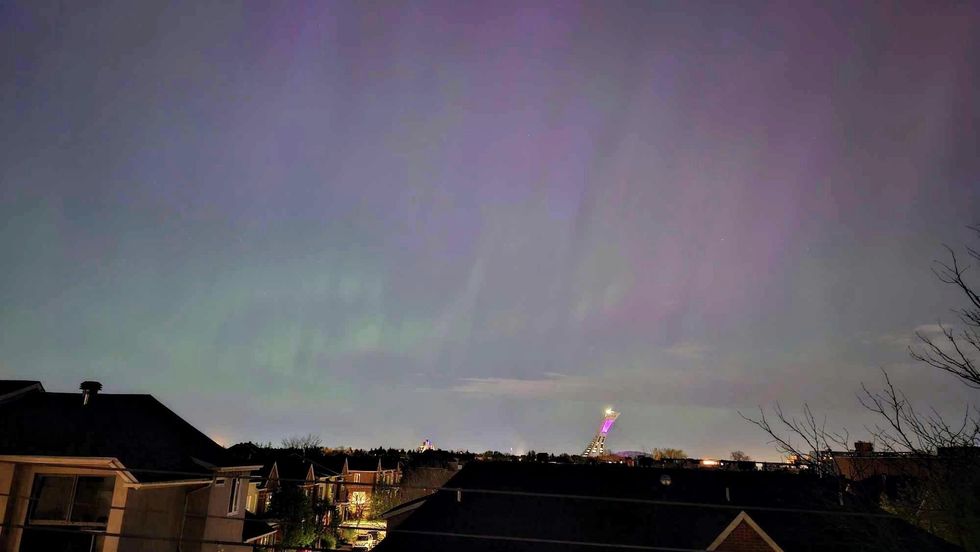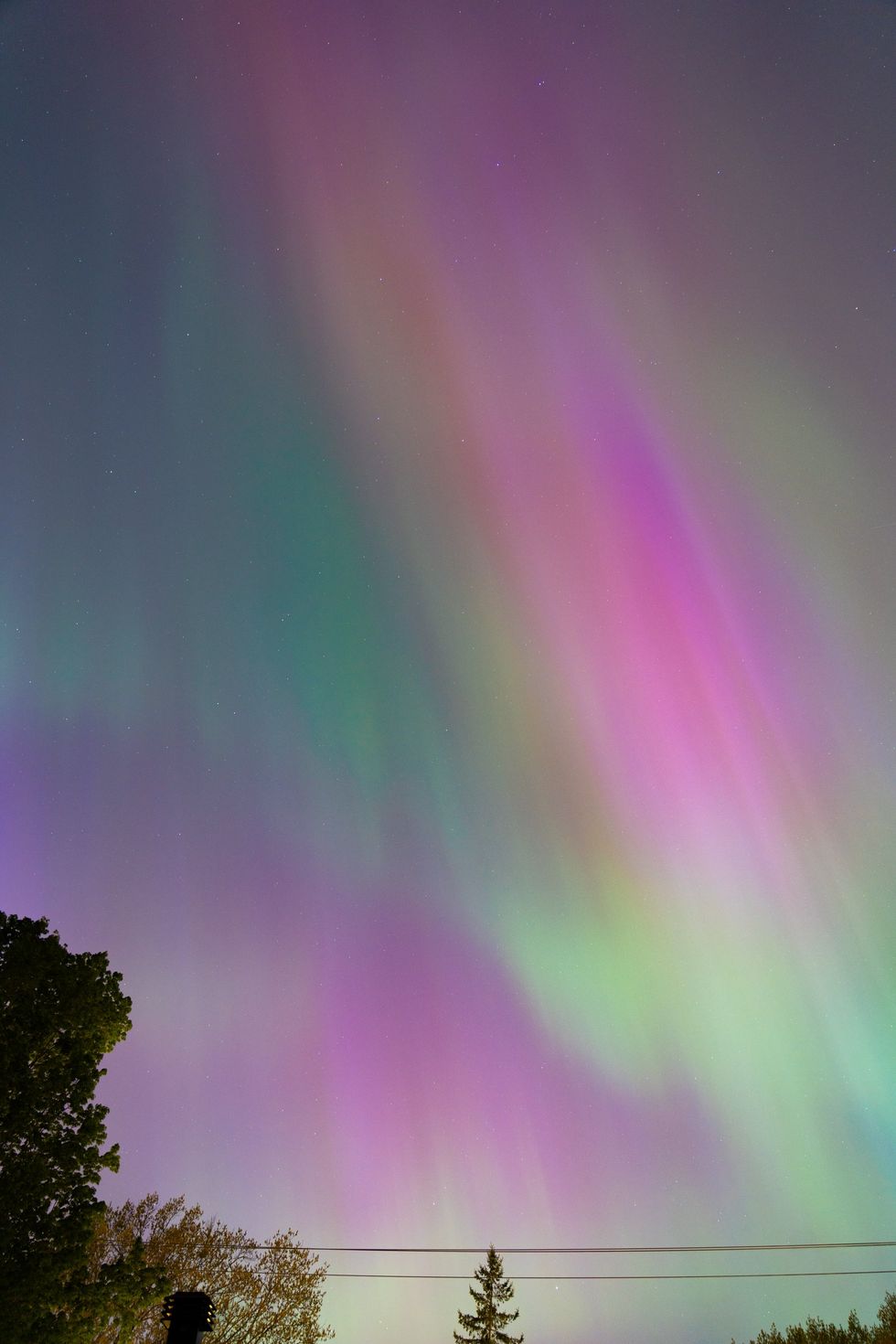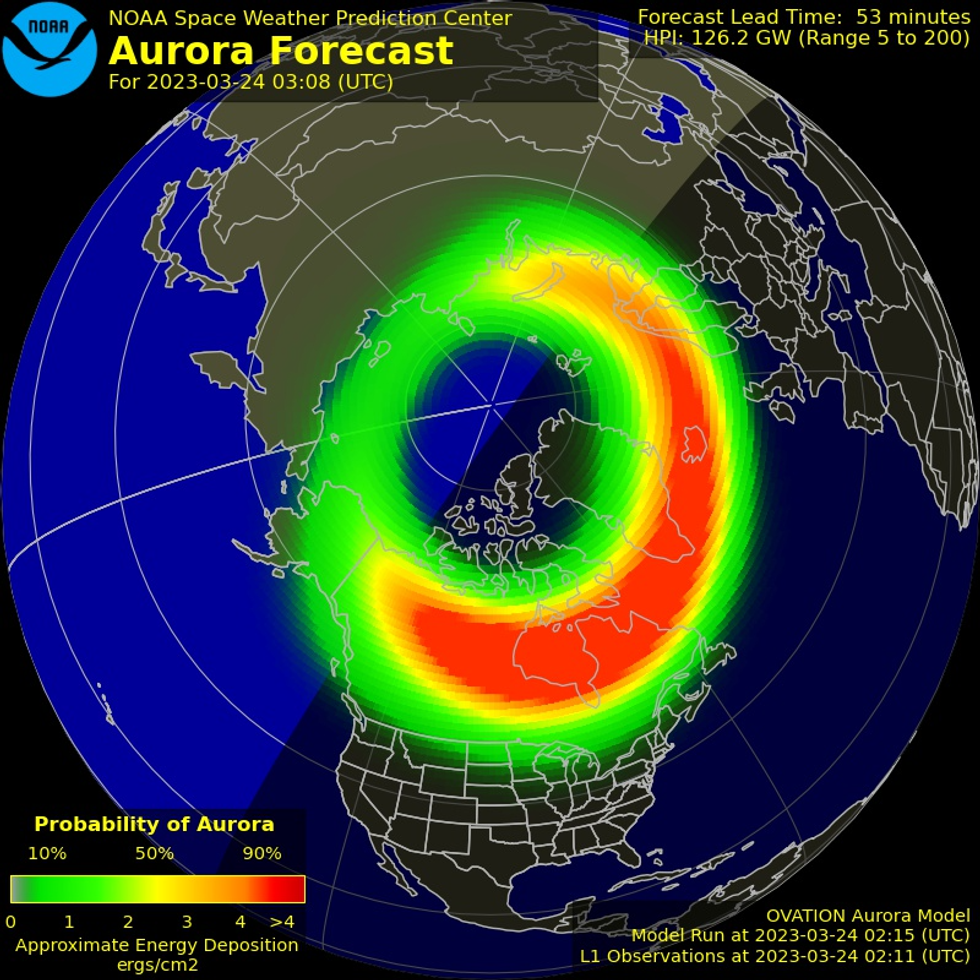How was everyone's weekend? I went to the Lachine Lighthouse to catch a glimpse of the northern lights and ran into Monsieur Rose while shopping downtown. There's more context on both of those things down below. I also finally got to try Frisquet, an artisan creamery in the Plateau, and the
Sweet-Salty ice cream sandwich did not disappoint.
It looks like we're in for some unfortunate weather this week, but don't let it rain on your parade! There are still plenty of exciting
things going on in Montreal.
THINGS TO KNOW
⚽ MESSI > MONTREAL
At a CF Montreal soccer game Saturday, local fans cheered for an Inter Miami CF player — even though they were on home turf at Saputo Stadium. Guess there's not much else you can do when the legendary Lionel Messi is on the other team. Montreal lost 3-2, but 'Messi mania' prevailed, as spectators witnessed Messi's historic first appearance playing on Canadian soil.
⛺ MCGILL HEADS TO COURT
Lawyers for McGill University appeared in court Monday morning. Why? They want an injunction that would allow them to dismantle the pro-Palestinian encampment that's been on the university's downtown campus for the past month. Meanwhile, a second pro-Palestinian encampment has popped up at the Université du Québec à Montréal campus.
🗓️ LONG WEEKEND AHEAD, BABY!
National Patriots' Day is coming up on Monday, May 20 (or, as everyone else in Canada calls it, Victoria Day... classic Quebec). It's a statutory holiday, which means that this is going to be a long weekend so get your plans in order... or make no plans at all, if that's more your speed.
WEATHER
It looks like we have a gloomy week and a rainy long weekend ahead of us in Montreal. But, hey, at least it'll be warm. Predictions suggest a weekly high of 24 degrees on Thursday and Sunday, and a weekly low of 12 degrees on Tuesday and Wednesday night. If you're as forgetful as I am, you might want to stock your car and your go-to purse or backpack with umbrellas, in addition to
keeping one by the front door — just to be on the safe side.
☀️ Thursday seems to be our only sunny salvation this week, so plan to spend the day outdoors — or at least go for a walk.
☔ Showers are expected Monday, Tuesday, Friday night, Saturday, and Sunday. While the forecast does not call for rain on Wednesday and Friday (daytime), it does call for clouds.
💨 As of Monday,
Air Quality was sitting at a "low risk" level two.
You can find the full seven-day forecast on the Environment Canada website. Predictions are subject to frequent change.
STAFF PICKS
Your guide to #NoFomo.
🍽️ WHAT TO EAT & DRINK
Brunch at Bar George
"Bar George is a must for your Montreal brunch bucket list. The downtown restaurant and bar is stunning with a Victorian-style wood-paneled dining room. The full English breakfast is hearty — eggs, beans, tomato, black pudding, bacon, sausage, and mushrooms ($29). If you’re into more classic brunch fare, the waffle with berries, maple syrup, almonds, and brioche ice cream ($18) is amazing. If you're looking for a special outing, brunch at Bar George keeps things elegant while staying more affordable than going there for dinner. Plus, it’s just steps from downtown, so you can easily fit in some weekend shopping." —
Sofia Misenheimer, Editor, MTL Blog
The Caprese or Muffuletta at Ciccio's
"Nothing hits quite like a good sandwich does. And I mean a
good sandwich. Since it opened its doors last fall, I've been meaning to give Italian sandwicherie Ciccio's a try and finally got a taste this weekend. Located in the Old Port, Ciccio's offers a variety of fresh Italian-inspired sandwiches, pastries and drinks. While everything was delicious (the Caprese and Muffuletta sandwiches were top-tier), what stood out most was the service. The staff is incredibly warm and welcoming, so much so that I felt like I'd been a regular for years." —
Mike Chaar, Assistant Editor, MTL Blog
🎲 WHAT TO DO
Follow Monsieur Rose (Mr. Pink)
"While shopping downtown over the weekend, it seemed like everywhere I went, a strange-looking naked pink man was following me. Or was I following him? Either way, he was getting up to some quirky, funny (and surprisingly poetic) shenanigans around town — holding up the city's famous ring installation with his arms and legs, scaling a building at Place des Arts and more. Upon further investigation, I discovered this was part of a public art exhibit featuring 'Monsieur Rose (Mr. Pink),' a character by beloved French artist Philippe Katerine. You'll be able to find the sculptures, standing up to 2.7 metres tall, from the Quartier des Spectacles to the Esplanade PVM at Place Ville Marie and Phillips Square until September 29. According to
Place des Arts, Monsieur Rose is an emblem of Katerine's mignonisme movement, which 'celebrates beauty in simplicity and wonderment in the every day through touching and funny creations,' which is exactly what I took from the experience of following in his footsteps." — Ilana Belfer, Senior Writer, MTL Blog (moi!)
BUT WAIT, THERE'S MORE:
- U-Pick Tulips (Daily until around May 21): If you want to take photos amongst sprawling multi-coloured tulip fields or pick your own bouquet, you'd better move quickly. Three pick-your-own-tulip farms near Montreal opened last week, but with an extremely short season — usually lasting two weeks — you' probably only have until Monday or so to cross this activity off your spring bucket list.
- This Show is Broken (Wednesday until Sunday at MainLine Theatre): What if you entered an empty rehearsal hall and suddenly an audience appeared? Joseph Ste-Marie dares to find out, bringing his experimental part-scripted, part-improvised one-man show back to the stage this week. Blending the best of previous productions from the Digital Theatre (2021), Montreal FRINGE Festival (2015) and Shortstanding Festival (2015), this latest exploration of Ste-Marie's life, struggles, missteps and dreams is one worth watching.
- THIS SHOW IS BROKEN DETAILS & TICKETS
- Porchfest NDG (Saturday and Sunday in Notre-Dame-de-Grâce, Monday if it rains): Porchfest is one of the city's most unique annual festivals and it returns for its eighth edition this weekend. Wander the streets of Notre-Dame-de-Grâce — or, you know, follow the map if you're one of those people who has their sh*t together — and find dozens of bands performing mini-concerts on neighbourhood porches. From folk to blues to psychedelic jazz, there's music to suit everyone's tastes, and even a porch side comedy show on avenue Mayfair. Name a better day to take a walk around the block!
- Retro-Spection Creative Market (Saturday and Sunday in Verdun): Vintage boutique Retro-Spection is hosting a huge outdoor market in a Verdun backyard this weekend. "Expect plenty of handmade goods like upcycled jewelry, clothing and accessories, tote bags and illustrations, handmade jewelry and hair accessories, body products, VHS movie notebooks, floral creations, candles and a big vintage selection at $5, $10, and $20," the Facebook event reads.
ADOPT-A-PET SPOTLIGHT
 Max, who's up for adoption at the Montreal SPCA, lies in the grass.Montreal SPCA
Max, who's up for adoption at the Montreal SPCA, lies in the grass.Montreal SPCA
Name: Max
Age: 1-year-old
Sex: Male
Breed: Mixed, Large (over 44 pounds when fully grown)
Weight: 33 kilograms (73 pounds)
Max stands out for his gorgeous colouring (those black and white spots!), long crimped ears and puppy dog eyes. Plus, at his young age, you'll have plenty of time to enjoy his company, gaining an additional family member for years to come. The only downside? It's going to be hard to say no to that adorable face. Max is one of
17 doggos currently up for adoption at the Montreal SPCA so scroll through and see if you can let him, or another pup, into your heart and home. Hopefully, they can all find the love and care they so deserve.
LEARN MORE
ICYMI: Last week's top story
Extraordinary shots of the northern lights glowing above the Montreal area
 The northern lights aka aurora borealis, visible in much of Canada and parts of the U.S. between May 10 and 11.@highwiregirl | Instagram, @terrissedepoche | Instagram
The northern lights aka aurora borealis, visible in much of Canada and parts of the U.S. between May 10 and 11.@highwiregirl | Instagram, @terrissedepoche | Instagram
The Montreal sky got a major 'glow up' over the weekend, as the northern lights aka aurora borealis put on a rare, dazzling celestial show due to a severe geomagnetic storm. If you missed it, or you simply want to marvel at this spectacular sight for as long as possible, we compiled extraordinary images taken in Montreal (and Quebec, up to an hour's drive away).
READ THE FULL STORY HERE
POLL
Someone call the poutine police! So far, 61% of you say anyone who likes ketchup on their poutine should go right to jail. What do you think about ketchup on poutine... Yes? No? Is it a crime?
Head to ASKMontreal to vote or comment.
 A screenshot of a poll taken from AskMontreal. AskMontreal
A screenshot of a poll taken from AskMontreal. AskMontreal
VOTE NOW
PUB TRIVIA (AT HOME)
Brought to you by Quizmaster Brian
🎉
Last week's answer: Honah-Lee
🤔
This week's question: Selena Gomez co-stars in Only Murders in the Building with Steve Martin and which other elderly actor?
Tune in next week for the answer and a new question!
Thanks for reading Montreal This Week. What did you like (or dislike) about today's edition? And what other information do you need to start your week off right? You can reach me with all feedback at ilana.belfer@mtlblog.com.
 Max, who's up for adoption at the Montreal SPCA, lies in the grass.Montreal SPCA
Max, who's up for adoption at the Montreal SPCA, lies in the grass.Montreal SPCA The northern lights aka aurora borealis, visible in much of Canada and parts of the U.S. between May 10 and 11.
The northern lights aka aurora borealis, visible in much of Canada and parts of the U.S. between May 10 and 11. A screenshot of a poll taken from AskMontreal. AskMontreal
A screenshot of a poll taken from AskMontreal. AskMontreal

 A view of the aurora probability across Canada at 11 p.m. EDT on March 23.
A view of the aurora probability across Canada at 11 p.m. EDT on March 23.